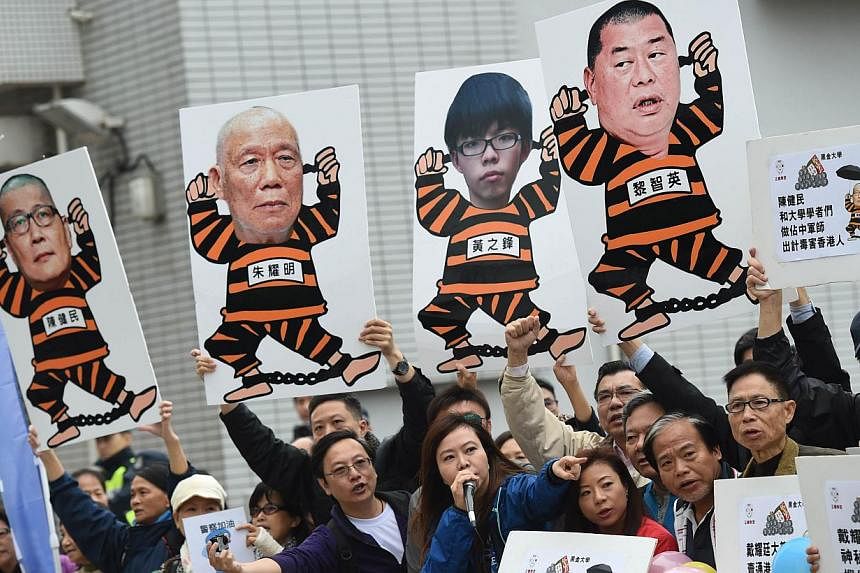HONG KONG - The three co-founders of the pro-democracy Occupy Central movement which has become Hong Kong's biggest civic disobedience campaign turned themselves in to the police on Wednesday.
Dozens of people joined the three - academics Benny Tai, Chan Kin-man, and Reverend Chu Yiu-ming, as they showed up at the Central Police Station near Sheung Wan, Radio Television Hong Kong (RTHK) reported. They included former Cardinal Joseph Zen, members of the opposition Democratic Party and civic activists.
Dozens of opponents of the Occupy movement staged a protest near the station, saying that the trio had damaged Hong Kong. Large numbers of police officers, meanwhile, stood on stand-by at the site to keep the two groups separate, RTHK said.
Mr Tai later tweeted to say they were allowed to "leave with no restrictions" after filling in a form which required them to "tick from list of offences on custom form, including taking part in unauthorised assembly, incitement, criminal damage".
"We still have to wait and see. We may still be arrested later and charged with more serious offence," he tweeted.
The trio had announced on Tuesday their decision to surrender to police, saying they wanted to take responsibility for how the movement has turned out beyond what they had planned. Since the movement escalated in late September, thousands of mainly-student protesters have camped out on Hong Kong's roads, paralysing traffic and forcing many shops to stay shut.
The protesters have also clashed with police, most recently on Sunday when they tried to surround the government's headquarters.
Tai, Chan and Chu on Tuesday publicly called on the students to retreat, fearing periodic clashes that have flared between the activists and police for the past two months may escalate into worse violence as the government prepared to clear more sites occupied by the movement.
Tai said the Occupy movement would now take a different approach to promoting its cause, including through education and a new social charter.
But student protesters who have launched a hunger strike vowed they would continue "suffering pain for justice".
Protest leader Joshua Wong, 18, and two other students who went on hunger strike late on Monday read out an emotional letter to the city's leader Leung Chun Ying from their tent outside government headquarters, Agence France-Presse reported.
"We believe we are doing better by suffering pain for justice than you are by having big meals," they said. "Please don't ask us to avoid the pain of a hunger strike. Please first ease the agony of suppression and the lack of freedom (suffered) by Hong Kong people."
They renewed their call for dialogue with the government over political reforms, AFP said. "They (the government) have brought society step-by-step towards the edge," Wong said.
The movement erupted after Beijing ruled in August that candidates for Hong Kong's leadership elections in 2017 must be vetted by a loyalist committee.
Chief Executive Leung Chun Ying said on Monday that public tolerance for the movement the past two months was "at a limit" and that more people were calling for the protest sites to be cleared.
"From now on, police will enforce the law without hesitation," Leung told reporters.



